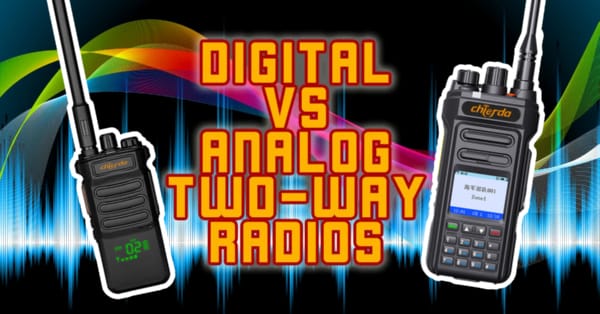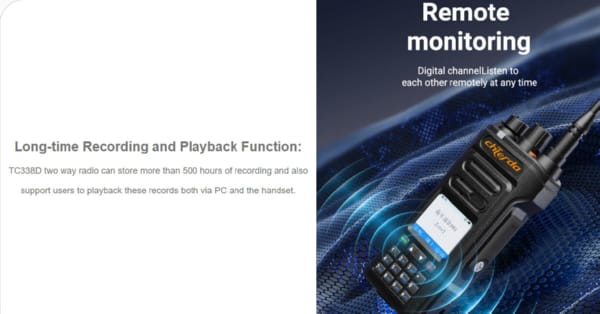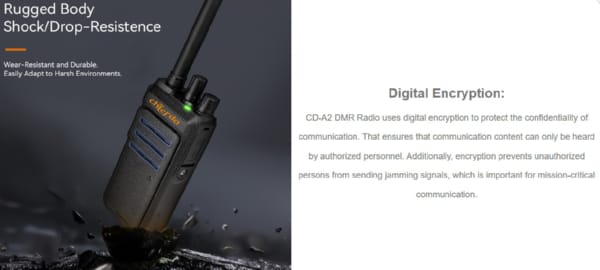For decades, analog two-way radios have been the trusted workhorse for business communication. But as technology evolves, a new question emerges for savvy business owners: is dmr better than analog? The choice between traditional analog and modern Digital Mobile Radio (DMR) is more than just a technical upgrade; it's a strategic decision that impacts your team's efficiency, security, and future growth. This guide breaks down the dmr vs analog debate to help you make the smartest investment for your business.

The Core Differences: 5 Key Areas in the DMR vs. Analog Debate
When you're deciding whether you should I upgrade to dmr radio?, understanding the fundamental differences is crucial. A modern digital radio for business offers significant advantages over its analog predecessors in several key areas.
Audio Quality: The End of Static and Background Noise
This is one of the most noticeable dmr radio benefits. Analog radios are prone to static and background noise, especially at the edge of their coverage area. DMR technology, however, converts your voice into digital data. This process includes error correction and noise-cancelling algorithms, delivering consistently clear audio quality from one end of the coverage area to the other.

Coverage & Range: Getting More from Your Signal
While both radio types lose signal strength over distance, how they perform at the edge of that coverage is vastly different. An analog signal gets progressively weaker and noisier. A DMR signal, however, remains strong and clear until it drops off completely. This means you get a larger usable coverage area with more reliable communication.
Battery Life: Powering Through Longer Shifts
DMR radios use a technology called Time-Division Multiple Access (TDMA), which allows for two simultaneous conversations on a single frequency. A major side benefit is that the radio only transmits for half the time of an analog radio, cutting power consumption by up to 40%. This drastic improvement in battery life means your team's radios will easily last through long shifts.
Secure Communication: Protecting Your Business Conversations
One of the most significant analog radio limitations is the lack of security; anyone with a scanner can listen in. DMR offers built-in encryption, making it a platform for truly secure communication. This is essential for industries like security, hospitality, and management, where protecting sensitive information is paramount. For top-tier security, advanced options like AES256 encryption are available on professional models.

Spectrum Efficiency: Doubling Your Channel Capacity
The same TDMA technology that improves battery life also doubles your channel capacity. A single 12.5 kHz frequency license can support two separate, simultaneous conversations. This incredible spectrum efficiency means you can have more user groups without needing additional expensive frequency licenses, a significant cost-effectiveness advantage.
Beyond Voice: Advanced DMR Radio Benefits for Business
The advantages of a digital radio for business extend far beyond voice calls. DMR technology opens the door to a host of data applications that can streamline your operations.

Text Messaging and Pre-programmed Messages
Send discreet text messages to individuals or groups when a voice call isn't appropriate. You can also send pre-programmed status updates like "On break" or "Task complete" with a single button press.
GPS Tracking for Fleet and Personnel Management
Many DMR radios can be equipped with GPS, allowing you to track the location of vehicles and personnel in real-time. This is invaluable for logistics, transportation, and ensuring employee safety.
Integration with Other Business Applications
DMR systems can be integrated with other business software, enabling features like work ticket management and automated alerts, turning your business two way radio into a multi-functional productivity tool.
The Investment Factor: Upfront Cost vs. Long-Term Value
It's true that DMR radios typically have a higher initial purchase price than their analog counterparts. However, it's crucial to look beyond the upfront cost and consider the total cost of ownership (TCO).
Analyzing the Initial Equipment Cost
While the initial hardware cost is higher, the long-term benefits often outweigh it. Consider it an investment in superior performance and future capabilities.
Calculating Long-Term Gains in Efficiency and Security
Think about the value of fewer misunderstandings due to poor audio, the security of your business data, and the productivity gains from advanced features. These factors contribute to a rapid return on investment.
Understanding Total Cost of Ownership (TCO)
With doubled channel capacity (potentially halving license fees) and more durable hardware, the long-term operational cost of a DMR system can be lower than an analog one. When you decide to upgrade to dmr, you're investing in a more efficient and scalable system.
Why Upgrading to DMR is a Future-Proof Decision for Your Business
While analog radios have served businesses well, DMR technology is the clear path forward. It offers superior audio, greater coverage, longer battery life, and mission-critical security that analog simply cannot match. By investing in DMR, you are not just buying a new radio; you are adopting a scalable, efficient, and secure communication platform that will support your business's growth for years to come.
FAQ: Your Questions About Migrating to DMR Answered
Can DMR radios talk to analog?
Yes, most professional DMR radios operate in a "dual mode" or "mixed mode," allowing them to communicate seamlessly with your existing fleet of analog radios. This makes a gradual transition to digital both possible and cost-effective.
Is a license required for DMR?
Just like professional analog radios, using DMR on business frequencies requires a license from the relevant authority in your country (e.g., the FCC in the US). The licensing process is similar for both technologies.
How difficult is it to switch from analog to DMR?
The transition is surprisingly straightforward. With dual-mode radios, you can replace your analog units over time. A reliable manufacturer can help you program your new DMR radios to work with your old system, ensuring a smooth migration.
What are the main benefits of DMR for a small business?
For a small business, the key benefits are crystal-clear communication that reduces errors, the professional security of encrypted calls, and the extended battery life that ensures your team is always connected. It’s a direct investment in professionalism and operational excellence.



